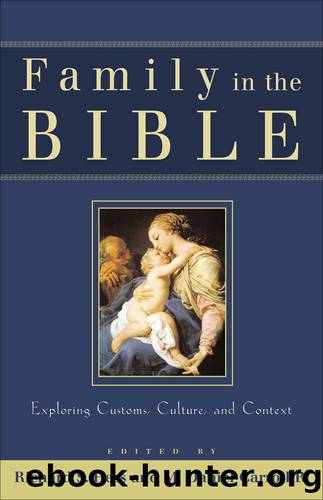Family in the Bible by Richard S. Hess

Author:Richard S. Hess [Richard S. Hess and M. Daniel Carroll R.]
Language: eng
Format: epub
ISBN: 9781441206695
Publisher: Baker Publishing Group
Family Metaphors in the Prophets
Thus far, the portraits that the Prophetic literature have offered us have been universally negative. As we now turn to the various metaphors based on the family, there will be positive models upon which to draw, but contrary images and lessons will surface as well.
In general terms, a metaphor is a comparison drawn between two entities and is grounded in analogy. The similarities, however, never can be total, so one needs to be aware of how each side of the analogy is distinctive and different from the other. Nor is a metaphor static, as its nuances and impact can change over time. Because of the finiteness of human experience and categories of understanding, humans can speak about Yahweh only through the use of metaphors. At the same time, no one metaphor can fully capture the essence and activity of the boundless character of God.[29] Hence, the Old Testament utilizes a wide variety of metaphors to describe Yahweh. They all must be held in combination and in tension to avoid reducing Yahwehâs person to one aspect or unwisely exaggerating one over the others. Each metaphor is counterbalanced and complemented by the theological richness of this variety. Scholars working with metaphorical language in the Bible increasingly are beginning to consciously appeal to more sophisticated models of metaphor in order to establish better theoretical foundations for their analysis of texts. This trend is evident, for example, among those investigating the marriage metaphor in the Prophets.[30]
The extended family was one of the most fruitful sources for metaphors in ancient Israel for communicating the nature of their relationship to Yahweh and the roles of each party in that relationship.[31] In that culture the bonds of the family were particularly strong, so it was appropriate and significant that the (covenant) relationship between the deity and his chosen people was expressed in these terms.[32] In what follows, because of space limitations, I am able to highlight only some of this material and pertinent passages.
To begin with, Yahweh could be envisioned as the father of Israel. In two passages the people of God appeal to his compassion as the father of the nation. They suffer because of his judgment, but even as they wonder how Yahweh has kept himself hidden from them, they can boldly turn to him and make a claim on his affection. He is their creator and a father greater than Abraham (Isa. 63:16; 64:8 [64:7 MT]).[33] Although Yahweh is not often called âfatherâ explicitly in the Prophets, the parentchild relationship is made evident by the fact that Israel many times is referred to as his son, or the people as his children, or Jerusalem as his daughter.[34]
It is important to remember the cultural (and biblical) demand that children respect their father as a backdrop for Yahwehâs insistence on obedience. Israel is to follow his statutes and to live a life worthy of the calling as the firstborn son in every dimension of their national existence. But Israel has been a stubborn and rebellious son, and Jerusalem a wayward daughter.
Download
This site does not store any files on its server. We only index and link to content provided by other sites. Please contact the content providers to delete copyright contents if any and email us, we'll remove relevant links or contents immediately.
Getting It, Then Getting Along by L. Reynolds Andiric(653)
Religion and Politics Beyond the Culture Wars : New Directions in a Divided America by Darren Dochuk(575)
Global Justice, Christology and Christian Ethics by Lisa Sowle Cahill(429)
Positive Psychology in Christian Perspective: Foundations, Concepts, and Applications by Charles Hackney(354)
Forgiveness and Christian Ethics by Unknown(348)
Douglas Hamp The First Six Days by Unknown(296)
The Horrors and Absurdities of Religion by Arthur Schopenhauer(271)
Insurgency, Counter-insurgency and Policing in Centre-West Mexico, 1926-1929 by Mark Lawrence(266)
Middle Eastern Minorities: The Impact of the Arab Spring by Ibrahim Zabad(250)
Christian Martyrdom and Christian Violence by Matthew D. Lundberg;(242)
The Oxford Handbook of Greek and Roman Mythography by R. Scott Smith;Stephen M. Trzaskoma;(235)
Beyond Heaven and Earth by Gabriel Levy(232)
God and Eros by Patterson Colin;Sweeney Conor;(230)
The Bloomsbury Reader in Christian-Muslim Relations, 600-1500 by David Thomas;(223)
Autobiography, Volume 2: 1937-1960, Exile's Odyssey by Mircea Eliade(216)
Witches: the history of a persecution by Nigel Cawthorne(211)
Cult Trip by Anke Richter(210)
An Introduction to Kierkegaard by Peter Vardy(198)
The Global Repositioning of Japanese Religions by Ugo Dessi(195)
